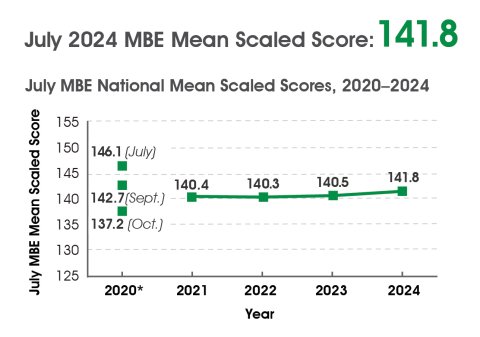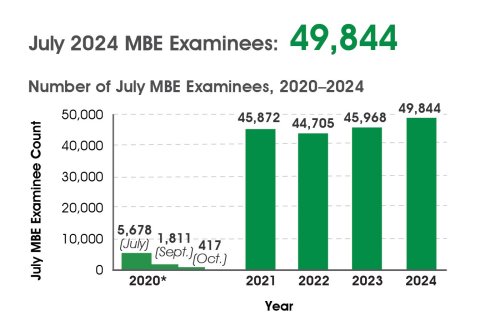NCBE Announces National Mean for July 2024 MBE
MADISON, WISCONSIN, August 29, 2024—The National Conference of Bar Examiners (NCBE) announced today that the national mean scaled score for the July 2024 Multistate Bar Examination (MBE) was 141.8, an increase of about 1.3 points compared to the July 2023 mean of 140.5 and the highest July MBE mean since 2013, excluding the summer and fall 2020 administrations.[1] The MBE, one of three sections that make up the bar exam in most US jurisdictions, consists of 200 multiple-choice questions answered over six hours.
49,844 examinees took the July 2024 MBE, an increase of more than 8% compared to the 45,968 examinees who sat for the exam in July 2023.
Approximately 76% of July 2024 examinees were likely taking the exam for the first time, and approximately 24% were likely repeat test takers.[2] This reflects an increase in the proportion of likely first-time takers and a decrease in the proportion of likely repeaters compared to July 2023, when approximately 75% of examinees were likely taking the exam for the first time and approximately 25% were likely repeat test takers.
* Graphs note: Due to the COVID-19 pandemic, the July 2020 MBE was administered on three separate dates: July 29, September 10, and October 1. The results shown are for in-person examinees only; approximately 29,000 additional examinees sat for a remotely administered exam using NCBE materials in October 2020. Comparability to other years’ results may be limited due to the lower examinee count.
NCBE Director of Psychometrics and Operations Rosemary Reshetar, EdD, commented: “Scores were up this July across most jurisdictions, and as a result we expect pass rates to go up in many jurisdictions compared to last year. The increase in both the number of July 2024 examinees and the national mean MBE score is likely explained in part by the enrollment trends that characterized the class of 2024. Law school applications in 2021, the year this class entered law school, increased by 13% compared to the previous year, and enrollment that fall shot up by 12%. Typically, when the number of applicants increases, law schools are able to be more selective, and this is also reflected in the 2021 admissions data—according to LSAC, the average LSAT score for this cohort was 1.27 points higher than in the prior year. LSAT scores are generally considered good predictors of bar exam scores. It is worth noting that 2021 represented a high point in the past decade, with application, enrollment, and LSAT numbers returning to their pre-2021 averages in the following years.”
The MBE is equated as part of the scoring process to control for any possible differences in exam difficulty compared to previous administrations.
Reliability for the July 2024 exam was 0.95, slightly higher than the reliability for the July 2023 exam and consistent with the reliability for recent July administrations. (Reliability is an indicator of the consistency of a set of examination scores, with a maximum value of 1.0.)
Jurisdictions will soon begin reporting their July 2024 results; bar examination pass rates as reported by jurisdictions are available on the NCBE website. Many jurisdictions are still in the process of grading the written components of the bar exam; once this process is completed, bar exam scores will be calculated and passing decisions reported by those jurisdictions.
[1] Due to low examinee counts for the July, September, and October 2020 in-person MBE administrations, comparability of results from those administrations to other years’ results may be limited.
[2] The first-time and repeat MBE-based test taker information calculated by NCBE is an approximation based on the NCBE Number and biographic data, which has not been used consistently in all jurisdictions across time. Prior to 2022, approximately 10% of examinees could not be tracked with certainty by NCBE as either first-time or repeat takers due to a lack of sufficient biographic information.
About the National Conference of Bar Examiners
The National Conference of Bar Examiners (NCBE), headquartered in Madison, Wisconsin, is a not-for-profit corporation founded in 1931. NCBE promotes fairness, integrity, and best practices in bar admissions for the benefit and protection of the public, in pursuit of its vision of a competent, ethical, and diverse legal profession. Best known for developing bar exam content used by 54 US jurisdictions, NCBE serves admission authorities, courts, the legal education community, and candidates by providing high-quality assessment products, services, and research; character investigations; and informational and educational resources and programs. In 2026, NCBE will launch the next generation of the bar examination, ensuring that the exam continues to test the knowledge, skills, and abilities required for competent entry-level legal practice in a changing profession. For more information, visit the NCBE website at https://www.ncbex.org.
About the Multistate Bar Examination
The Multistate Bar Examination (MBE) is a six-hour, 200-question multiple-choice examination developed by NCBE and administered by user jurisdictions as part of the bar examination, typically given twice each year. The purpose of the MBE is to assess the extent to which an examinee can apply fundamental legal principles and legal reasoning to analyze given fact patterns. The subjects tested on the MBE are Civil Procedure, Constitutional Law, Contracts, Criminal Law and Procedure, Evidence, Real Property, and Torts. In addition to assessing examinee knowledge and skills, the MBE is used to equate the bar exam. Equating is a statistical procedure used for most large-scale standardized tests to ensure that exam scores retain the same meaning across administrations and over time. More information about the MBE is available on the NCBE website at https://www.ncbex.org/exams/mbe/.
About the Uniform Bar Examination
The UBE is a two-day bar examination composed of the Multistate Essay Examination (MEE), two Multistate Performance Test (MPT) tasks, and the Multistate Bar Examination (MBE). It is uniformly administered, graded, and scored and results in a portable score that can be transferred to other UBE jurisdictions. More information about the UBE is available on the NCBE website at https://www.ncbex.org/exams/ube/. 41 US jurisdictions currently participate in the UBE, and more than 45,000 examinees took the UBE in 2023.

